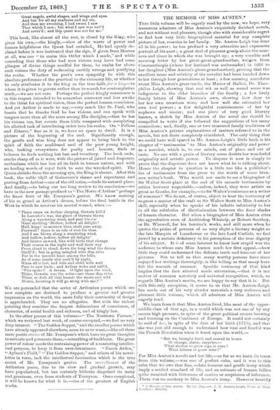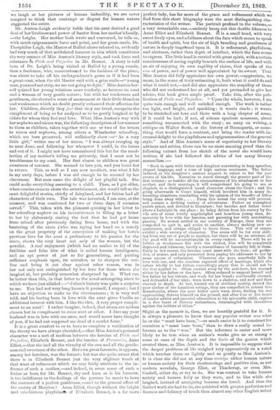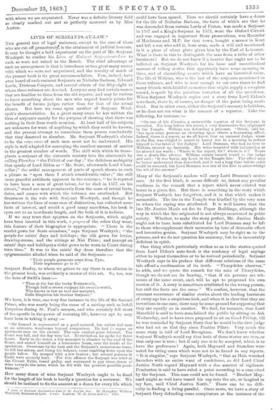THE MEMOIR OF MISS AUSTEN.*
THIS little volume will be eagerly read by the now, we hope, very numerous admirers of Miss Austen's exquisitely finished novels, and not without real pleasure, though also with considerable regret to find how very little biographical material for any complete picture of her, remains in her family. Mr. Austen-Leigh has done all in his power ; he has prefixed a very attractive and expressive portrait of his aunt ; a great deal of pleasant gossip about the man- ners and times in which she was brought up ; a very sensible and amusing letter by her great-great-grandmother, written from
Constantinople (where her husband was ambassador) in 1666 to her daughter (Miss Austen's great-grandmother), proving that the excellent sense and sobriety of the novelist had been handed down to her through four generations at least ; a few amusing anecdotes about Miss Austen's great-uncle, the Master of Balliol, 1)r. Theo- philus Leigh, showing that real wit as well as sound sense was
indigenous in the elder branches of the family ; a few lively family letters of Miss Austen's own, showing how dear to her her own creations were, and how well she estimated her own real powers ; a few delightful reminiscences of her by
nephews and nieces ; and one piece of very good literary banter, a sketch by Miss Austen of the novel she should be compelled to write if she followed the suggestions of her many counsellors ; and, finally, one or two treasured family traditions of Miss Austeu's private explanations of matters referred to iu the novels, but not there completely elucidated. The only thing that we could have well spared in Mr. Austen-Leigh's little book is his chapter of " testimonies " to Miss Austen's originality and power as a novelist, which is, to our minds, out of place and out of taste. No one with a grain of literary sense doubts her wonderful originality and artistic power. To dispute it now is simply to prove that the disputant does not know what he is talking about.
Hence the chapter iu question is a little too like a publisher's list of testimonies from the press to the worth of some bran- new writer's book. Who would not smile to see a biographer of Sir Walter Scott place at the end of his memoir testimonies by critics however respectable,—unless, indeed, they were artists as great as Goethe, for example,—to Sir Walter's eminence as a writer of romance? We do not, of course, object to hear the testimony of so great a master of the craft as Sir Walter Scott to Miss Austen's skill, especially when he speaks of his infinite inferiority to her in all the subtleties of discrimination between the finer shades of human character. But when a biographer of Miss Austen cites the approbation even of Archbishop Whately, or Robert Southey, or Dr. Whewell, for his heroine's works, and still more when he quotes the praise of persons of so very slight a literary weight as the late Marquis of Lansdowne or the late Lord Carlisle, we feel
jarred by a certain deficiency in his perception of the true dignity of his subject. It is of some interest to know how stupid was the audience to whose ears Miss Austen made her first appeal,—how little they could understand the delicate truth and humour of her pictures. But to tell us that many worthy persons have since enjoyed her writings thoroughly, is like telling us that many have felt the warmth of summer. Specific testimony of that kind implies that the fact attested needs attestation,—that it is not
matter of common notoriety and universal recognition, which, as regards Miss Austen's merits, we are happy to say that it is. But with this only exception, it seems to us that Mr. Austen-Leigh has made out of his very slender materials a very welcome and pleasant little volume, which all admirers of Miss Austen will eagerly read.
We learn from it that Miss Austen lived, like most of the upper- middle class of that age, in a world which was not one of by any means high pressure, in spite of the great political events brewing and bursting on the Continent of Europe. It could not certainly
be said of her, in spite of the date of her birth (1775), and that she was just old enough to understand how vast and fearful was the French Revolution when it burst upon the world,— " But we, brought forth and reared in hours
Of change, alarm, surprise,— What shelter to grow ripe is ours ? What leisure to grow wise ?"
For Miss Austen's novels and her life,—so far as we learn its tenor from this volume,—was one of perfect calm, and it was to this calm that we owe that fine, sedate humour and gentle irony which imply a settled standard of life, and an estimate of human follies quite unmixed with bitterness of motive or scepticism of inference. There was no mockery in Miss Austen's irony. However heartily
• A Memoir of lane Austen. By her Nephew, J. E. Austen-Leigh, Vicar or Bray. London: Bentley.
we laugh at ber pictures of human imbecility, we are never tempted to think that contempt or disgust for human nature suggested the satire.
Mr. Austen-Leigh evidently holds that his aunt derived a good deal of her liveliness and power of banter from her mother's family, —the Leighs. Her mother both wrote and conversed, he tells us, with much epigrammatic force and point, and'her great-uncle, Dr. Theophilus Leigh, the Master of Balliol above referred to, evidently had very much of that acidulated humour in him which constitutes the very essence of Miss Austen's literary style, and took form and substance fn Pride and Prejudice in Mr. Bennet. A story is told here of Dr. Leigh's being visited at Balliol by a young cousin, then a freshman, who, unaccustomed to the fashions of the place, was about to take off his undergraduate's gown as if it had been a great-coat, when the old Master said with a grim smile—" young man, you need not strip, we are not going to fight." Miss Austen her- self quizzed her young relations more tenderly, as became an aunt and a woman of very gentle nature ; but with her tenderness and gentleness, she showed a sense of amusement at their little blunders and weaknesses which no doubt greatly enhanced their affection for her. Children, directly they feel that they are loved, recognize the compliment of being so far analyzed as to be gently laughed at by elders for whom they feel real love. What Miss Austen's way with her nephews and nieces was, the following description of her manner to them as children, taken together with one or two of the letters to nieces and nephews, among others a Winchester schoolboy, which are here preserved, will sufficiently show :—" As a very little girl," writes one of her nieces, " I was always creeping up to aunt Jane, and following her whenever I could, in the house and out of it. I might not have remembered this but for the recol- lection of my mother's telling me privately, that I must not be troublesome to my aunt. Her first charm to children was great sweetness of manner. She seemed to love you, and you loved her in return. This, as well as I can now recollect, was what I felt in my early days, before I was old enough to be amused by her cleverness. But soon came the delight of her playful talk. She could make everything amusing to a child. Then, as I got older, when cousins came to share the entertainment, she would tell us the most delightful stories, chiefly of fairyland, and her fairies had all characters of their own. The tale was invented, I am sure, at the moment, and was continued for two or three days, if occasion served." This, taken with the pleasant quizzing in her letter to her schoolboy nephew on his inventiveness in filling up a letter to her by elaborately stating the fact that he had got home from school after previously dating from home, and with the bantering of the niece (who was trying her hand on a novel) on the great propriety of the conception of making her hero's previous love for the aunt a preliminary to his passion for the niece, shows the very heart not only of the woman, but the novelist. A real enjoyment (which had no malice in it) of the futilities and false bits of what is called human intelligence, and an apt power of just so far generalizing, and putting sufficient emphasis upon, its mistakes, as to sharpen the out- line and bring it out clear against sober reason, was in her not only not extinguished by her love for those whom she laughed at, but probably somewhat sharpened by it. What can be better than this, in that letter to the novel-attempting niece to which we have just alluded:—" Julian's history was quite a surprise to me. You had not very long known it yourself, I suspect ; but I have no objection to make to the circumstance ; it is very well told, and his having been in love with the aunt gives Cecilia an additional interest with him. I like the idea. A very proper compli- ment to an aunt ! I rather imagine, indeed, that nieces are seldom chosen but in compliment to some aunt or other. I dare say your husband was in love with me once, and would never have thought of you, if he had not supposed me dead of a scarlet fever."
It is a great comfort to us to have so complete a verification of the theory we have always cherished,—that Miss Austen's personal character was a sort of medium between the heroine of Pride and Prejudice, Elizabeth Bennet, and the heroine of Persuasion, Anne Elliot, —that she had all the vivacity of the one and all the gentle- ness and sweetness of the other. Her own great favourite, it appears, among her heroines, was the former ; but was she quite aware that there is in Elizabeth Bennet just the very slightest touch of that want of refinement which we may fairly attribute to the in- fluence of such a mother,—and indeed, in some sense of such a father as hers, for Mr. Bennet, dry and keen as is his humour, is too indifferent to the feelings of the persons he meets to have the manners of a perfect gentleman,—and to the general effect of the society of Meryton? Anne Elliot, though without the bright and mischievous playfulnelb of Elizabeth Bennet, is a far more perfect lady, has far more of the grace and refinement which we find from this short biography were the most distinguishing cha- racteristics of the writer. The portrait prefixed to the volume,— a very remarkable one,—entirely bear out this doable likeness to Anne Elliot and Elizabeth Bennet. rt is a small head, with very sweet lively eyes, and a fullness about the face which seems to speak of health and spirit, but the air of high breeding and gentleness of nature is deeply impressed upon it. It is refinement, playfulness, and alertness, rather than depth of intellect, which the face seems to express. The little head is carried with great spirit, with a certain consciousness of seeing rapidly beneath the surface of life, and with an air of enjoying its own rapidity of vision, that speaks of the ease of power, and of power well appreciated by its owner. That Miss Austen did fully appreciate her own power,—appreciate, we mean, in the sense of truly estimating it, both what it could do and what it could not,—and did also appreciate the stupidity of those who did not understand her at all, and yet pretended to give her advice, this book gives ample proof. Take this, after the pub- lication of Pride and Prejudice. " Upon the whole, however, I am quite vain enough and well satisfied enough. The work is rather too light, and bright, and sparkling ; it wants shade ; it wants to be stretched out here and there with a long chapter of sense, if it could be had ; if not, of solemn specious nonsense, about something unconnected with the story ; an essay on writing, a critique on Walter Scott, or the history of Buonaparte, or some- thing that would form a contrast, and bring the reader with in- creased delight to the playfulness and epigrammatism of the general style." And of Miss Austen's sense of superiority to her literary advisers and critics, there can be no more amusing proof than the following extract from her sketch of the novel she would have written if she had followed the advice of her many literary counsellors :—
" Book to open with father and daughter conversing in long speeches, elegant language, and a tone of high serious sentiment. The father induced, at his daughter's earnest request, to relate to her the past events of his life. Narrative to reach through the greater part of the first volume ; as besides all the circumstances of his attachment to her mother, and their marriage, it will comprehend his going to sea as chaplain to a distinguished naval character about the Court ; and his going afterwards to Court himself, which involved him in many in- teresting situations, concluding with his opinion of the benefits of tithes being done away with . . . From this outset the story will proceed, and contain a striking variety of adventures. Father an exemplary parish priest, and devoted to literature ; but heroine and father never above a fortnight in one place : he being driven from his curacy by the vile arts of some totally unprincipled and heartless young man, de- sperately in love with the heroine, and pursuing her with unrelenting passion. No sooner settled in one country of Europe, than they are compelled to quit it and retire to another, always making new ac- quaintance, and always obliged to leave them. This will of course exhibit a wide variety of character. The scene will be for ever shift- ing from one set of people to another, but there will be no mixture, all the good will be unexceptionable in every respect. There will be no foibles or weaknesses but with the wicked, who will be completely depraved and infamous, hardly a resemblance of humanity left in them. Early in her career, the heroine must meet with the hero ; all perfec- tion, of course, and only prevented from paying his addresses to her by some excess of refinement. Wherever she goes, somebody falls in love with her, and she receives repeated offers of marriage, which she refers wholly to her father, exceedingly angry that he should not be the first applied to. Often carried away by the anti-hero, but rescued either by her father or the hero. Often reduced to support herself and her father by her talents, and work for her bread ; continually cheated, and defrauded of her hire; worn down to a skeleton, and now and then starved to death. At last, hunted out of civilized society, denied the poor shelter of the humblest cottage, they are compelled to retreat into Kamskatcha, where the poor father quite worn down, finding his end approaching, throws himself on the ground, and after four or five hours of tender advice and parental admonition to his miserable child, expires in a fine burst of literary enthusiasm, intermingled with invectives against the holders of tithes."
Slight as the memoir is, then, we are heartily grateful for it. It is always a pleasure to know that any popular writer was what he or she " must have been,"—so much easier is it to construct for ourselves a " must have been," than to draw a really sound in- ference as to the " was." But the inference is easier and more likely to be true when an author's works give us so strong a sense at once of the depth and the limits of the genius which
created them, as Miss Austen's. It is impossible to suppose that the deeper problems of life weighed very oppressively on a tiaind
which touches them so lightly and so gently as Miss Austen's.
It is clear she did not at any time arraign either human nature or human society for their shortcomings and positive sins, as our
modern novelists, George Eliot, or Thackeray, or even Mrs.
Gaskell, either do, or try to do. She was content to take human society and human folly as they were, and to like while she laughed, instead of arraigning because she loved. And thus the limited work she had to do, she achieved with greater perfection and fineness and delicacy of touch than almost any other English writer with whom we are acquainted. Never was a definite literary field so clearly marked out and so perfectly mastered as by Miss Austen.




































 Previous page
Previous page